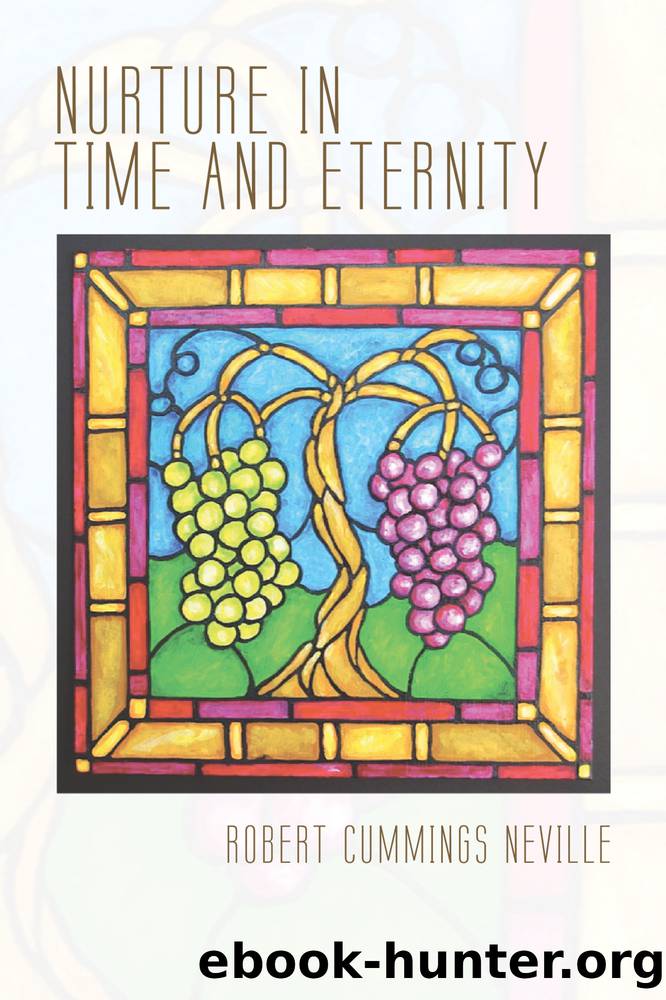Nurture in Time and Eternity by Neville Robert Cummings;

Author:Neville, Robert Cummings; [Neville, Robert Cummings]
Language: eng
Format: epub
ISBN: 9781498286220
Publisher: Wipf and Stock Publishers
Published: 2016-07-04T07:00:00+00:00
18. Preached January 22, 2006, the third Sunday after Epiphany.
19
Authority Now and in the Old Times19
Deuteronomy 18:11â20; 1 Corinthians 8:1â13; Mark 1:21â28
The problem of authority in religion vexes us today as it has throughout history. One of the ongoing battles of the American culture wars is the dispute over the authority of Scripture. Fundamentalists say that the scriptures are literally true. More moderate evangelicals say it is sometimes hard to determine what the Scriptures say, but when you do determine that, it is absolutely binding because its truth is divinely inspired. Neo-orthodox theologians such as Karl Barth say that the Scriptures themselves are not inspired but that they are witnesses to events that are divinely inspired, or are God-in-action. Theologians such as Paul Tillich say the real authority is the depth dimension of human experience, and that this allows us to interpret the religious meaning of Scriptures. Eastern Orthodox theologians tend to say that the Scriptures are primary in a long tradition, which, as embodied in church councils, is authoritative, including its interpretation of Scripture. Roman Catholics theologians say much the same thing but add that the pope is the authoritative arbiter of competing elements in the tradition when he speaks ex cathedra. One dimension of the Protestant Reformation stresses the authority of individual responsibility so much that each person is his or her own authority, even in the interpretation of Scripture. Many Americans like to think there is no authority at all, that all truth is relative, and that each person can decide what to believe and do on the basis of will, or whim.
If you think this is a confusing situation with regard to authority, things were no better in the ancient world. Consider our three texts.
In the Deuteronomy text, just before Moses died and the people entered into the promised land, he was exhorting them with the news that the Lord would raise up a prophet like himself after his demise. Look closely at the reason the text gives for why there have to be prophets. On Sinai or Horeb, God himself (yes, he was male) came close and almost killed the people with his holiness. So Moses as prophet was a safe substitute for God, speaking for God without threatening the people with Godâs own presence. He also said the people should obey his successor, because he too would speak for God. In point of fact, no prophet ever arose in Israel as great as Moses, who was a friend of God. Moses could get close without being consumed. Joshua, his immediate successor, was an effective military leader, but no profound friend of God or spiritual guide. Elijah was a fearsome agent of Yahwehâs powers, blasting the priests of Baal and rallying the people; he heard the still, small voice. But he was no friend of God who liberated the people of Israel to the extent Moses had. Christians, of course, like to think of Jesus as the successor prophet to Moses. The name âJesusâ
Download
This site does not store any files on its server. We only index and link to content provided by other sites. Please contact the content providers to delete copyright contents if any and email us, we'll remove relevant links or contents immediately.
| Adult Ministry | Children's Ministry |
| Counseling & Recovery | Discipleship |
| Evangelism | Missions & Missionary Work |
| Preaching | Sermons |
| Youth Ministry |
Victory over the Darkness by Neil T. Anderson(2869)
The Rape Of Nanking by Iris Chang(2828)
Chosen by God by R. C. Sproul(2165)
Habits of Grace by David Mathis(1984)
Crash the Chatterbox by Steven Furtick(1978)
Knowing God by J.I. Packer(1860)
How To Be Born Again by Billy Graham(1782)
A Prophet with Honor by William C. Martin(1727)
Gospel-Shaped Marriage by Chad van Dixhoorn(1719)
Peace with God by Billy Graham(1691)
Confronting Christianity by Rebecca McLaughlin(1593)
God's Smuggler by Brother Andrew(1549)
Angel Dreams by Virtue Doreen Virtue Melissa(1483)
Whisper by Mark Batterson(1459)
The School of Biblical Evangelism by Ray Comfort(1438)
Missionaries by Norman Lewis(1430)
The Truth War by John MacArthur(1426)
The Poems of Rowan Williams by Rowan Williams(1358)
Do Greater Things by Robby Dawkins(1329)
